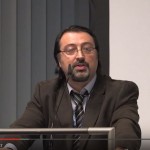Matthew 5:1-12 contains the so-called beatitudes in the teachings of Jesus. The beatitudes are at the beginning of the Sermon on the Mount, a highly studied and significant record of Christ’s teachings in His own words.
Seeing the crowds, he went up on the mountain, and when he sat down, his disciples came to him.
2 And he opened his mouth and taught them, saying:
3 “Blessed are the poor in spirit, for theirs is the kingdom of heaven.
4 “Blessed are those who mourn, for they shall be comforted.
5 “Blessed are the meek, for they shall inherit the earth.
6 “Blessed are those who hunger and thirst for righteousness, for they shall be satisfied.
7 “Blessed are the merciful, for they shall receive mercy.
8 “Blessed are the pure in heart, for they shall see God.
9 “Blessed are the peacemakers, for they shall be called sons of God.
10 “Blessed are those who are persecuted for righteousness’ sake, for theirs is the kingdom of heaven.
11 “Blessed are you when others revile you and persecute you and utter all kinds of evil against
you falsely on my account. 12 Rejoice and be glad, for your reward is great in heaven, for so they persecuted the prophets who were before you. (ESV)
I want to point out the first one: Blessed are the poor in spirit, for theirs is the kingdom of heaven. Most of the times I have heard talks and sermons on this verse, the speaker, be it a man or a woman, gives a rather wrong interpretation. They tend to treat the phrase “poor in spirit” as if it means “poverty of spirit,” “lack of spirituality,” “going through hard times spiritually,” “struggling in one’s faith,” ‘’falling short of having of the Spirit of God,” “hungering for the spiritual things.”
None of these interpretations are right, as long as they insist that the poverty relates mainly to the spiritual state of the person. It is actually that the spiritual state of the person is such, that that his attitude is of being materially poor in this world.
The New Life Version even translates it like this: “Those who know there is nothing good in themselves are happy, because the holy nation of heaven is theirs.” Not that far from the proper meaning but still focusing on rather lacking spirituality and worthiness of self, rather than focusing on lacking of material possessions.
The Greek translation of “poor” actually means “those who own nothing.” It is not the poverty that defines the spiritual condition, it is the opposite – the spiritual condition evokes a feeling of poverty, a sense of owning nothing of material value in this world. It is not that you are in a destitute spiritual state. That would not be a blessing, but a curse. Jesus teaches that it is a blessing to be so spiritually connected with the things of God that regardless of your actual wealth or lack thereof here on earth, you consider yourself to be poor. Materially poor. Financially poor. You have nothing; you have it, but it is of no value to you, nor is it a goal in your life.
This interpretation goes along with the other teachings of Jesus on the competition between faith in God and material wealth, mammon. You cannot serve God and mammon (Matt. 6:24); the invitation to the rich young ruler to leave his wealth and influence, discard of his possessions and to come follow Him (Mark 10:17-27); sending His disciples on a mission trip to preach and demonstrate the kingdom of heaven without any means of payment (Matthew 10:9).
The mission in Matthew 10, of sending the 12 apostles, contained two parts: to proclaim the message and to do works that obviously went along with that message. The message was: “The kingdom of heaven is near.” The works were: Heal the sick, raise the dead, cleanse those who have leprosy, drive out demons.” Freely you have received, freely give (v. 8). The demonstration of the kingdom of heaven was not to be tied to the secular financial system of exchange of value and money.
The above examples additionally speak that it is a blessed state when in your spirit you have
acknowledged that you have nothing to hold on to in this world. This acknowledgement can be applied to people who are actually rich in this world, and have a lot of money and possessions, and people who are materially poor and have very little to live life on earth. Both categories of people can be either “poor in spirit” or the opposite – “rich in spirit.”
To understand “poor in spirit” we may look to explain what is to be “rich in spirit.” If in your spirit you focus on money, material possessions in order to secure your life on earth, then regardless of the state of your finances and material wellbeing, you are “rich in spirit.” Your spiritual life, your connection to God, is tied to your earthly state of wellbeing. Your life is tied to earth. You understand the clear logic of this life and this world; that if you have money and possessions, you will have an easy and desirable life on earth. As long as you live on earth, riches will help you fulfill your dreams and desires, and people will respect and honor you. If you’re poor on earth, you will have few friends, and you will live a limited life. These are the simple reasons for all the “get rich quick” schemes to be so popular, as well as lotteries and gambling. People want to get rich, so they can have a good life on earth.
However, spiritual life is a category of the teaching of Jesus that points to life that recognizes not only living in this material world, but also that man has an inner life, connected to the aspiration for more, for a life beyond the mere life on earth. That is why it is the spirit that is charged with judging the value of life – be it on earth or in the spiritual realm. This is to say that you can be poor by the spiritual values you have, even if you are rich in earthly possessions – they do not interest you. You do not hold them in as high a regard as you do matters of the spirit, of life eternal, of God, and of issues of moral value.
One might wonder how can someone who is materially poor can also be poor in spirit; or more simply put, if you do not have anything, how can you be rich in spirit? In the very same way that you can be rich in possessions, yet poor in spirit. People who are poor do not necessarily lack completely. They still have some money or possessions, but very little in order to live a happy life on earth. However, they understand that to live a good life on earth, you need to have money and possessions. Thus, they strive and want to change the situation. They want to move from poverty to riches. That is the reason why many people from poor regions and countries emigrate and move to start a life in richer countries. That is why people seek education and “opportunities in life” – because they are “rich in spirit” – it is their understanding that riches are the way to have a good life in this world. And those of poor countries who cannot move to rich countries, if we expand that example of today, feel sorry, left behind, as if they’re missing out on life. “Riches” is their standard, even if they don’t have access to it. Their internal spiritual life is overwhelmed by the desire to be rich, and not poor in this world. Therefore, they are rich in spirit.
In an opposite fashion, the poor in spirit, either rich or poor in possessions, consider themselves poor because they know that no riches or earthly goods would be taken to the eternal life which they expect and hope for. They are blessed because they have seen the truth about what is actually of value. However, the blessing does not end with only this understanding. Jesus continues to say that “theirs is the kingdom of heaven.”
The Lord’s prayer goes: “May Your kingdom come, may Your will be done, on earth, as it is in heaven.” In Matthew 18 we read that “whatever you loose on earth will be loosed in heaven, and whatever you bind on earth will bound in heaven.” For those who seek God and His kingdom, life on earth is not limited to success on earth. There is an invisible, spiritual, yet real intertwining of the earth, the visible world, and the presence of heaven on earth as a result of the work and ministry of Jesus and the faith of those who seek God.
If you are poor in this world, then naturally, the kingdom of heaven is what you are looking for. This means that the resources of the kingdom of heaven will be at your disposal. If you are rich in this world, you do not need the kingdom of heaven, because you are spiritually rich. You are satisfied that you have goals in this life and for this life. That is why we are blessed, if in our spirits we feel poor according to the world’s values and possessions, and like we have nothing to hold onto on this earth. We live for the world to come, yet the blessings begin even now.
The message is: “The kingdom of heaven is at hand” and it belongs to the poor, who have nothing in this dying world.



